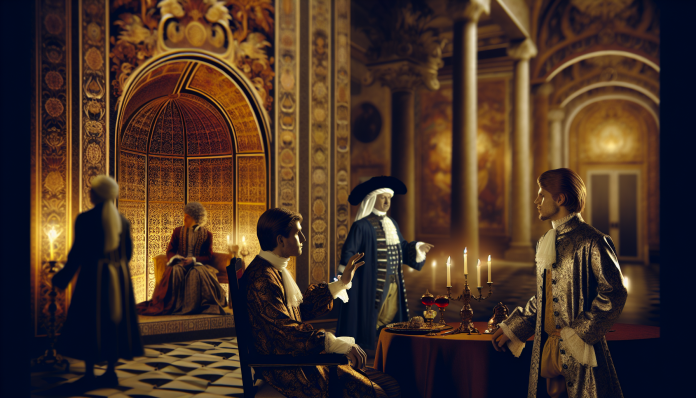Beethoven’s Forbidden Romances and Passionate Letters: A Tantalizing Glimpse into a Composer’s Heart
Introduction
Ludwig van Beethoven, a name synonymous with musical genius, also had a love life that could rival the most intense operatic dramas of his time. While widely recognized for his compositions that pushed the boundaries of classical music, Beethoven’s personal affairs reveal a tapestry of desire, longing, and scandal. In a society governed by strict moral codes, the passionate romances and fervent letters of this iconic composer paint a portrait of not just a man of music, but a man of emotion and fervor.
The late 18th and early 19th centuries, a time of radical enlightenment and shifting social norms, set the stage for Beethoven’s romantic entanglements. During a period characterized by a rigid class structure and stringent sexual mores, his relationships were fraught with societal implications. As we delve into the romantic exploits of Beethoven, we’ll uncover how these escaped the public eye – and what they reveal about shifting attitudes toward sexuality both then and now.
The Scandal
Although Beethoven is best remembered for his sonatas and symphonies, his heart beats louder in the passionate letters he penned, particularly to a shadowy muse recognized only as “Immortal Beloved.” These letters, discovered posthumously, brim with longing and emotional complexity. Addressed to this unnamed woman, the letters are filled with confessions of love and desire, shimmering with fervor yet haunted by the circumstances that stifled their potential.
Key Events
-
Romantic Pursuits: Beethoven’s affections appear to have been directed toward several noblewomen, notably Countess Josephine von Browne and Giulietta Guicciardi. His intense admiration for these women often spilled over into flirtation, and the letters offer insight into their illicit liaisons – a contrast to the prudishness of upper-class 19th-century society.
- The Immortal Beloved Letters: After Beethoven’s death in 1827, the discovery of these letters caused a stir among scholars, critics, and fans alike. They encapsulated a love that was not just a private affair but also a challenge to social conventions. The letters remain a subject of intrigue, sparking debates about the identity of the “Immortal Beloved,” and by extension, the nature of love itself in Beethoven’s life.
Public Reactions
At the time, Beethoven’s love life was shrouded in whispers and scandal. Romantic affairs involving unmarried men and women of the aristocracy often drew public scrutiny, leading to public outrage and social ostracism. For Beethoven, who operated within the cultural landscape of Vienna, a city teeming with artistic expression yet steeped in traditional values, his passionate letters caused quite a stir.
One notable historian noted the prevailing stance: “A man must retain his dignity above all. Beethoven’s overt displays of emotion were seen as both brave and foolish; a true artist should struggle in silence.”
Moral and Cultural Analysis
Societal Reaction
In Beethoven’s era, romantic relationships were heavily regulated by social class, gender roles, and expectations. Most upper-class women had limited agency, and any dalliance considered inappropriate could significantly damage reputations. Beethoven, an artist of significant repute, found himself at odds with societal expectations.
- Consequences: Beethoven’s ardor for women of higher social status often led to heartbreak and frustration. His pursuit of Countess Josephine remained unfulfilled, leading to a sense of tragic heroism as he poured that pent-up passion into his music. The emotional weight of these failed romances would echo in his works, emphasizing a personal struggle intertwined with societal constraints.
Modern Perspectives
Fast forward to the 21st century, and the notions surrounding love, sex, and power dynamics have significantly evolved.
-
Contemporary Views: Today, Beethoven’s passionate correspondence would likely be celebrated rather than scorned. Modern audiences may view his ardor as a testament to the depth of human emotion, rather than a scandal. The liberation of sexual norms and the ensuing discussions about consent, power dynamics, and personal agency redefine the landscape through which we understand past romances.
- Comparison to Today: Unlike in Beethoven’s time, the social media age allows for open discussions about love and sexuality. The advent of dating apps and a culture that embraces sexual expression and diversity stands in stark contrast to Beethoven’s experiences. Instead of suppression, there exists a trend toward celebration of romantic freedom.
Conclusion
Beethoven’s romantic escapades offer more than just a glimpse into the composer’s life; they provide valuable insight into the evolution of societal attitudes toward sex, gender roles, and emotional expression. His passionate letters remind us that the struggle between personal desires and societal expectations is not new; it reverberates throughout history and continues to shape our present.
As we reflect on Beethoven’s legacy, we are prompted to consider how far we have come in embracing the complexities of love and identity, and to question the constraints that still linger in various forms today.
Ultimately, the tale of Beethoven’s forbidden romances encourages a critical examination of our own values. It reminds us that love, in all its forms, has the power to challenge convention, inspire art, and transcend the barriers imposed by society. Just like Beethoven’s compositions, it is a melody that deserves to be played loud and clear through the ages.

